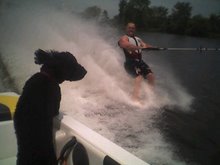Creating a digital library in 759 was challenging enough, but using the Open source software, Greenstone was especially difficult for various reasons. It is a great alternative to proprietary software, free to download, view, and implement, and like wiki, users can modify its source code. Students encountered many problems with the installation and interface design. In order to make it easier for the next group of digital library students, a wiki was created to document problems, solutions and experiences.
Wiki has become a powerful social networking tool for public, academic, school and business libraries. Participants value wiki as a place to share content, notes, communicate problems, eliminate, and add information. Wikis are described as a sketch pad, and a place to brainstorm.
How do librarians use wikis?
Librarians can visit Library Success: A Best Practices Wiki, a site that allows librarians from all over the world to contribute suggestions, innovations of programs, and provide a link to other information that is useful to librarians. As it goes with wikis, librarians may also edit the information on the site as well as create it. For example, the wiki WebJunction just recently featured the topic, Online Communities, where librarians contribute on the success of programs in their libraries.
LISWiki a Library Information Science Wiki links to articles on the definition and use of Digitization and Vanity publisher. From this wiki, I discovered that Buffy the Vampire Slayer has a Book cage at her Sunnydale High School library. This is vital information. Where else could a librarian find this, but a wiki. How do you deal with cell phones in a library? Just look at the wiki and see what other librarians are doing.
Open editing allows any user to create and edit content.
Brian Lamb in his article Wide Open Space: Wikis, Ready or Not , compares the openness of wiki to a person leaving the front door of their home open with friendly neighbors outside gossiping and keeping an eye on things. The term “SoftSecurity” is used to describe the ethics of the Wiki, meaning the community enforces a code of ethics.
MeatballWiki compares“SoftSecurity” to water. It bends under attack, only to rush in from all directions to fill the gaps. It's strong over time yet adaptable to any shape. It seeks to influence and encourage, not control and enforce. Whereas "hard security" functions by restricting access or hiding pages.” Another term used by Meatball Wiki, BarnRaising instills a picture of an Amish community literally raising a barn together, and living life as one family.
The blog Library Voice , by Chad, seems to be an expert on wikis and many other library 2.0 subjects. He posted slides from a colleague on how libraries use wikis. Have a look at the site, Wikis: A Beginner's Look.
The following wikis are free for open source projects.
MediaWiki
SocialText
TWiki
Wikispaces
My favorite, the peanut butter wiki, as easy as a peanut butter sandwich.
Of course I have to end with a quote. Charles Mingus may not be a role model for temperament or wikis, but he was an advocate for change and creativity. This describes the concept behind a wiki perfectly.
“ Making the simple complicated is commonplace; making the complicated simple, awesomely simple, that’s creativity.”




